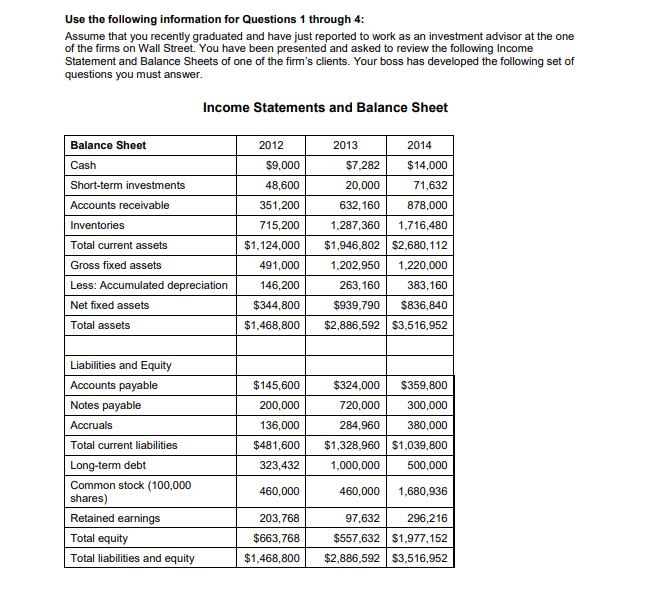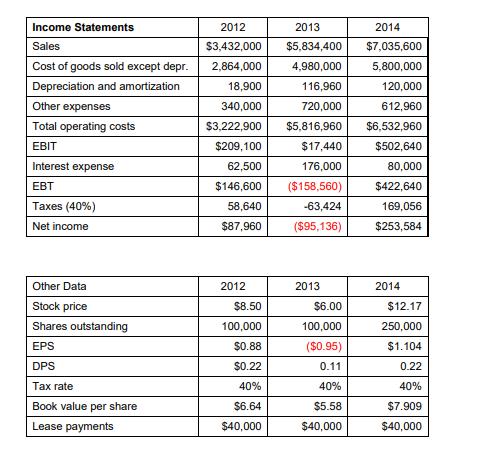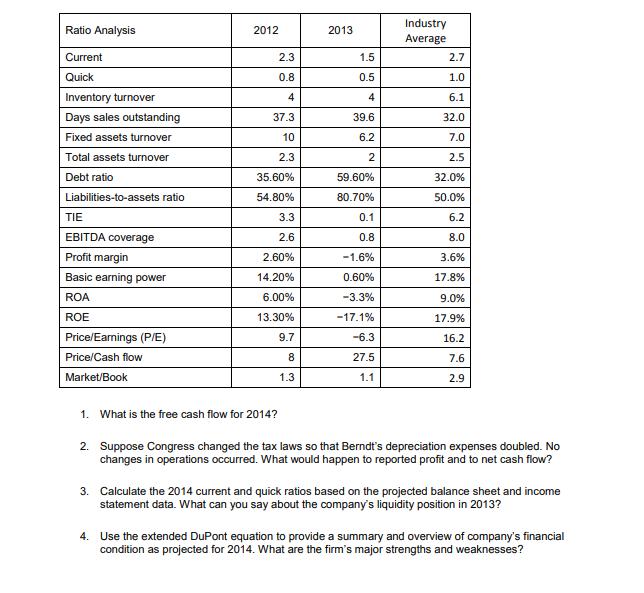Answered step by step
Verified Expert Solution
Question
1 Approved Answer
Use the following information for Questions 1 through 4: Assume that you recently graduated and have just reported to work as an investment advisor



Use the following information for Questions 1 through 4: Assume that you recently graduated and have just reported to work as an investment advisor at the one of the firms on Wall Street. You have been presented and asked to review the following Income Statement and Balance Sheets of one of the firm's clients. Your boss has developed the following set of questions you must answer. Balance Sheet Cash Short-term investments Accounts receivable Inventories Total current assets Gross fixed assets Less: Accumulated depreciation Net fixed assets Total assets Liabilities and Equity Accounts payable Notes payable Accruals Total current liabilities Long-term debt Common stock (100,000 shares) Retained earnings Income Statements and Balance Sheet Total equity Total liabilities and equity 2012 $9,000 48,600 351,200 715,200 2013 $7,282 20,000 632,160 1,287,360 1,716,480 $1,124,000 $1,946,802 $2,680,112 491,000 1,202,950 1,220,000 146,200 263, 160 383,160 $344,800 $939,790 $836,840 $1,468,800 $2,886,592 $3,516,952 $145,600 200,000 136,000 $481,600 323,432 460,000 203,768 $663,768 $1,468,800 2014 $14,000 71,632 878,000 $324,000 $359,800 720,000 300,000 284,960 380,000 $1,328,960 $1,039,800 1,000,000 500,000 460,000 1,680,936 97,632 296,216 $557,632 $1,977,152 $2,886,592 $3,516,952 Income Statements Sales Cost of goods sold except depr. Depreciation and amortization Other expenses Total operating costs EBIT Interest expense EBT Taxes (40%) Net income Other Data Stock price Shares outstanding EPS DPS Tax rate Book value per share Lease payments 2012 $3,432,000 2,864,000 18,900 340,000 $3,222,900 $209,100 62,500 $146,600 58,640 $87,960 2012 $8.50 100,000 $0.88 $0.22 40% $6.64 $40,000 2013 $5,834,400 4,980,000 116,960 720,000 $5,816,960 $17,440 176,000 ($158,560) -63,424 ($95,136) 2013 $6.00 100,000 ($0.95) 0.11 40% $5.58 $40,000 2014 $7,035,600 5,800,000 120,000 612,960 $6,532,960 $502,640 80,000 $422,640 169,056 $253,584 2014 $12.17 250,000 $1.104 0.22 40% $7.909 $40,000 Ratio Analysis Current Quick Inventory turnover Days sales outstanding Fixed assets turnover Total assets turnover Debt ratio Liabilities-to-assets ratio TIE EBITDA coverage Profit margin Basic earning power ROA ROE Price/Earnings (P/E) Price/Cash flow Market/Book 2012 2.3 0.8 4 37.3 10 2.3 35.60% 54.80% 3.3 2.6 2.60% 14.20% 6.00% 13.30% 1. What is the free cash flow for 2014? 9.7 8 1.3 2013 1.5 0.5 4 39.6 6.2 2 59.60% 80.70% 0.1 0.8 -1.6% 0.60% -3.3% -17.1% -6.3 27.5 1.1 Industry Average 2.7 1.0 6.1 32.0 7.0 2.5 32.0% 50.0% 6.2 8.0 3.6% 17.8% 9.0% 17.9% 16.2 7.6 2.9 2. Suppose Congress changed the tax laws so that Berndt's depreciation expenses doubled. No changes in operations occurred. What would happen to reported profit and to net cash flow? 3. Calculate the 2014 current and quick ratios based on the projected balance sheet and income statement data. What can you say about the company's liquidity position in 2013? 4. Use the extended DuPont equation to provide a summary and overview of company's financial condition as projected for 2014. What are the firm's major strengths and weaknesses?
Step by Step Solution
★★★★★
3.39 Rating (155 Votes )
There are 3 Steps involved in it
Step: 1
1 FCFF 2012 2013 2014 Net income 169056 95136 253584 AddDepreciation 18900 116960 120000 LessCapex 491000 1202950 1220000 LessChanges in WC 805760 617...
Get Instant Access to Expert-Tailored Solutions
See step-by-step solutions with expert insights and AI powered tools for academic success
Step: 2

Step: 3

Ace Your Homework with AI
Get the answers you need in no time with our AI-driven, step-by-step assistance
Get Started


